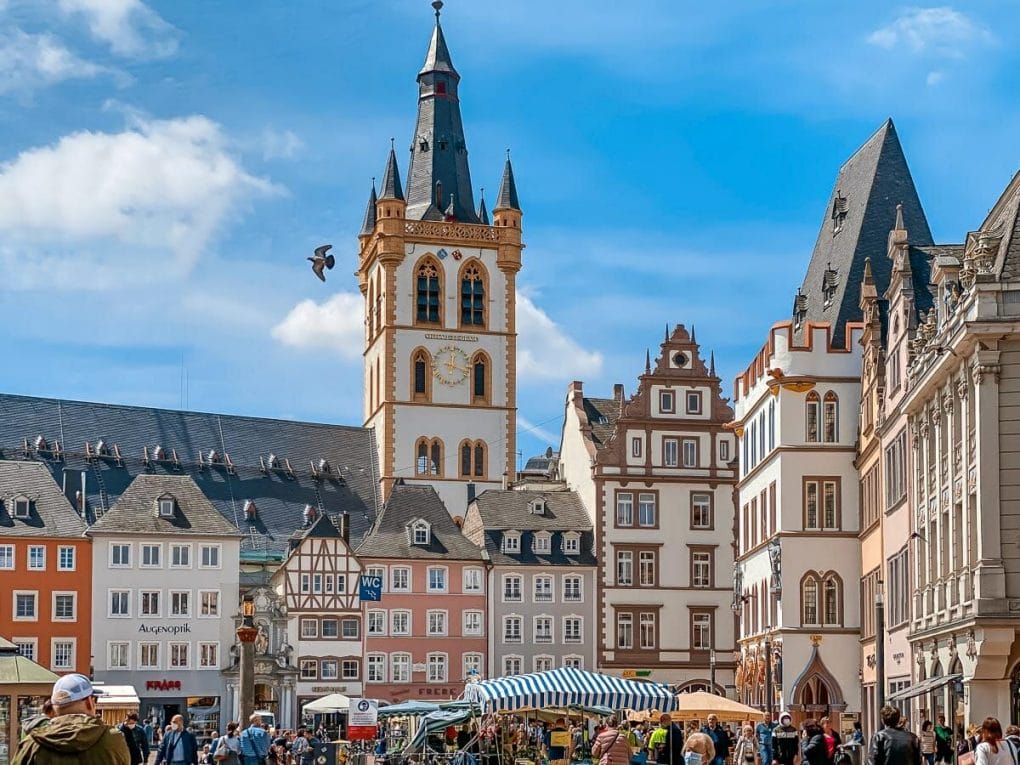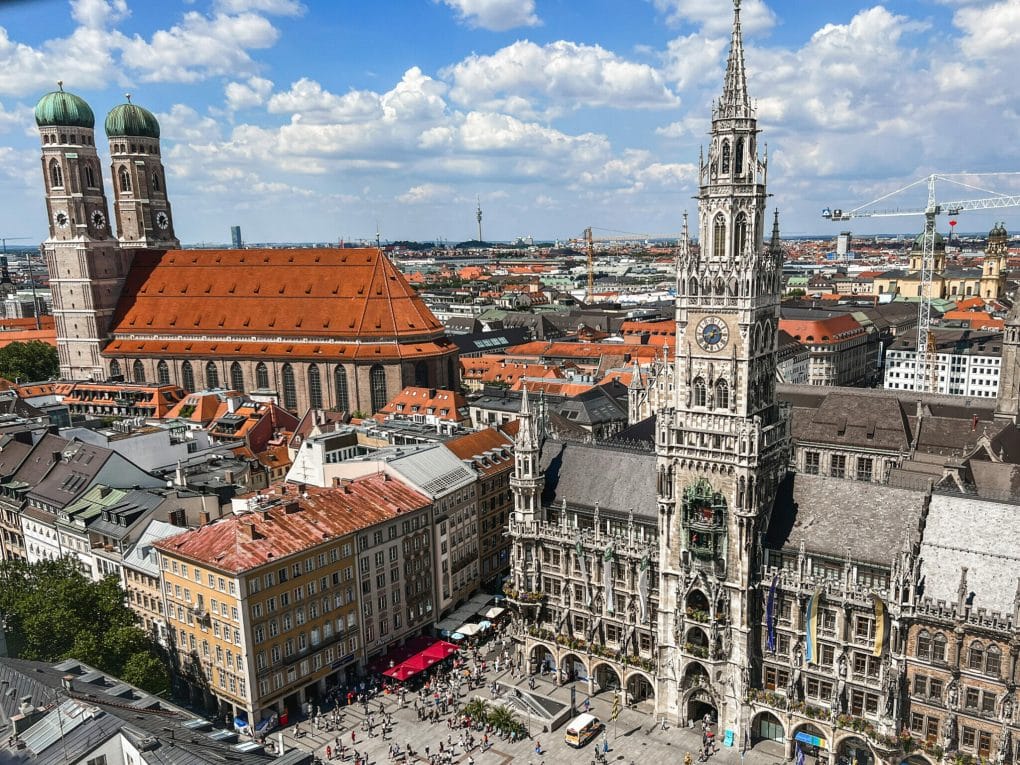This list shares some of the pros and cons of living in Germany for those thinking of moving there, whether to study, work or live,
I’ve had the privilege of living abroad in 4 countries thus far in my young adult life, which means I’ve experienced my fair share of culture shocks, adjustment woes, and the joys of learning about a new place.
This is true of my time in Germany as well! And admittedly, I’ve found Germany to be the toughest for me to assimilate and settle in. But, as it turns out, I’m not alone. Germany often ranks poorly in surveys of expats and immigrants for a few reasons (some of which I touch on in this list!).
Struggles aside, I’ve come to appreciate my time and life in Germany, and I am beyond thankful that I’ve even had the opportunity to do so (because trust me, I could write an even longer list of the pros and cons of living in the U.S. right now)!!
So if you’re wondering what some pros and cons of living in Germany are (from the perspective of an American), I’ve got you covered!
*This list shares generalizations based on my personal experience as an American living in small-town Germany and is in no way accurate for everyone, everywhere, at all times in the country. Ok, disclosure done; let’s go!
↠ Read more: How to Move to Germany From the USA
This post may contain affiliate links, meaning at no additional cost to you, if you click my links and make a purchase, I may earn a small commission. Learn more on my disclosure page. Thank you for your support!
22 Pros and Cons of Living in Germany (as an American)
Let’s get the negative out first. Here are some things that are “cons of living in Germany” or rather, things that may take some getting used to depending on where you’re from.
11 Cons of Living in Germany
1. There’s a lotta bureaucracy.
No pros and cons of living in Germany list is complete without mentioning the country’s penchant for bureaucracy, something that’s no secret to locals. Here everything has a particular way of doing things and usually involves a bit of red tape. It’s hard to clearly articulate, but maybe I can share some examples to make my point.
- You can purchase a million different types of insurance to protect against any and every little thing.
- To earn your driver’s license, you must undergo fairly intensive classes, a written test, etc., and it often costs €2,000 when it’s all said and done.
- When I opened my bank account, I had to legit sign 20 forms.
- And when I forgot my password to my online banking app, I had to go to the bank to unlock it in person.
2. Many things in the country feel outdated.
I was surprised to find that, from a technological standpoint, many things are outdated in Germany. For example, Germany is often ranked as having some of the slowest WIFI services in Europe, many businesses accept cash only (although COVID has helped change that), and I frequently experience spotty cell service throughout the country even though it’s relatively densely populated.
When I have to make any sort of appointment, it must be done via email or over a phone call, where a simple online form would suffice. And these calls and emails are rarely answered, or it takes weeks to get any reply.
3. There are many rules and a strict cultural norm of following them.
A popular stereotype about Germans is that they love rules, and while this doesn’t apply to everything and everyone, honestly I’ve found it to be fairly true. And anyone who breaks a rule, regardless of how small and inconsequential it is, is at risk of being publicly scolded by a local. Now, of course, when you’re living in and visiting a different country, it’s of the utmost importance to respect local norms and customs.
But it does get to you when you’re scolded for seemingly small things, especially things you don’t even realize you’re doing wrong. I’ve been yelled at for walking on the wrong side of a wide, rural road by a biker (even though I felt safer there, there’s little traffic, and EVERYONE in my neighborhood does it for safety). I’ve been scolded for jaywalking when the light changes. And the classic, I’ve been yelled at for not speaking German in Germany, even as I take classes and try my best.
Not saying this kind of stuff doesn’t happen in the states (Karen culture, anyone?), but it feels pretty frequent to the point that I felt the need to write about it (obviously). Why go out of your way to scold a stranger for something that isn’t hurting anyone?
4. Germans are known to be difficult to befriend and can be “blunt”.
Per my previous point, Germans are known to speak directly and bluntly. They don’t necessarily sugarcoat anything and are often straight to the point. Not only that, but it can take some time for locals to warm up to new people because they’re generally more reserved and don’t enjoy small talk.
I’m from the Midwest, so this type of “coldness” was a difficult thing for me to get used to, and it came off as rude to me at first. But this is a cultural norm and not meant to be rude (usually).
5. People stare, a lot.
The idea that it’s “impolite to stare” doesn’t seem to exist here. If you Google this cultural norm, you’ll likely find funny memes and videos by immigrants and expats teasing this phenomenon. When I first moved here, I’d often worry I had something on my face or was doing something weird, but I have since gotten used to it.
6. Trains are expensive and notoriously delayed.
Germany may be well connected by trains (a pro I’ll expand on below), but the national train service Deutsche Bahn (D.B.), is often the butt of jokes for its delays and cancellations. Not only that, but I’ve traveled extensively, and Germany is up there as having some of the most expensive public transportation.
While there are discount day or group travel passes that can help save money, single tickets on the regional trains are pricey. For example, to get to my nearest city, I take a three-stop, 15-minute local ride that costs €4.20 one-way. Now imagine how much that price jumps when going any significant distance and traveling round trip.
7. Everything is closed on Sundays.
In Germany, most shops and businesses are closed on Sundays, including grocery stores. Just about the only thing open on Sundays are some restaurants and tourist attractions. Honestly, this one, I sway between liking and disliking. I really appreciate the importance of work-life balance here, and that Sunday is actually used as a day of rest.
However, not only is everything closed on Sunday, but you must be quiet. You can’t take glass recycling out; you can’t mow the lawn; you can’t even vacuum your home if it disturbs your neighbors. To me, Sunday is a day of rest but also a great day to do chores (Saturday is my day of fun). It’s not a biggie, but does take some getting used to.
8. There’s a lack of variety when it comes to food and beer.
Don’t get me wrong, I love traditional German food. But as a foodie, I find that the country doesn’t have a whole lot of options, especially in small towns. Aside from classic German restaurants, you’ll typically find Italian, kebab, sushi, and the occasional one-off. For example, from our home, we have about 10 restaurants we can order from, 95% of which offer the same pizza, pasta, and German offerings.
I will say that Berlin and bigger German cities are excluded from this generalization, but compared to other European capitals, the food scene is still lacking overall, in my opinion.
Now for the beer…German beer is good. HOWEVER, Germany has a beer purity law that states beer must be made with only three traditional ingredients: hops, barley, and water. This means that there’s also a lack of variety in beer flavors. Traditional German beers include pilsners, bocks, Oktoberfest, wheat ales, altbier, etc., but anything craft or with a unique flavor are likely exports, hard to find, and pricey.
9. No free tap water and limited public drinking fountains.
At most restaurants, you must buy bottled water (and ask for still/without gas!); they will not give you a complimentary glass of tap water. And when a place does have tap water on the menu (Leitungswasser), it’s still not usually free and will probably run you a euro or two.
Additionally, public drinking fountains aren’t the norm here. As someone who’s always thirsty and who tries to avoid buying bottled water for budget and environmental reasons, this hurts my little heart.
10. The language barrier.
Many Germans, especially in small towns, don’t speak English, and if they do, many are too shy or unwilling to speak it. Fair enough, it’s their country! But I was a bit surprised because Germans do learn English in school from a young age.
As an international student attempting to learn German and make friends, the language barrier has definitely hindered my ability to make many connections. So it’s important to note that if you’re serious about living in Germany and meeting locals, learning the language is a must. In Berlin and other big cities, English is more widely spoken.
11. Germany has pretty gloomy weather.
I knew other places like the U.K. and Scandinavia, for example, were known for their cloudy, rainy weather. But I had no idea Germany had a similar climate —at least in western, central Germany, where we live. I suppose all the rain is to thank for the fertile vineyards in the region, though, and who can be mad about that? And at least that means that winters are fairly mild compared to where I’m from in the states!
11 Pros of Living in Germany
Now that the cons are out of the way, let’s dive into everything I love about living in Germany.
1. Free/affordable healthcare.
Germany requires everyone to have health insurance by law, and although it’s not entirely free, I pay about €200 a month as a 30-year-old for T.K. health insurance (€100 when I was under 30) for full coverage. And even with the high taxes used to subsidized healthcare, it’s worth the extra expense. If anything were to happen and I’d need an extensive procedure, I’d be covered in Germany. I can’t say the same for the U.S. As an American, free and affordable healthcare is a biggie.
2. Free/affordable education.
In Germany, public universities are free and don’t charge tuition rates—even for international students! That means you can get a Master’s degree in Germany for essentially free, paying only about €300 per semester to cover admin fees. It’s a dream and a great opportunity for many looking for a way to live in Germany.
↠ Read more: What is the Cost of Studying in Germany?

3. There are walking and bike paths everywhere.
One thing I’ve grown very fond of is the miles of hiking and biking trails that cut through the German countryside. Even in places that seem so rural and remote, you can likely find a signposted route nearby or a serene wooden bench where you can sit and relax in nature. This is undoubtedly thanks to hiking being a popular activity for Germans.
While most of Germany doesn’t rock mountains (you have to head south to Bavaria for epic peaks), pretty landscapes like riverways, rolling hills, valleys, vineyards, and more offer lots to see and enjoy outdoors.

4. There are many beautiful places to see and explore.
Admittedly, I don’t love German cities. Because of the war, most were completely destroyed and rebuilt into modern metropolises that aren’t all that dissimilar from what you can see in the United States.
However, German small towns, the mountains in Bavaria, the vineyards, and the many castle ruins around the nation offer a unique travel experience for Americans and non-Europeans. Germany also has historical ties to the Romans, so there are plenty of fantastic Roman ruins to see, especially where we live near Germany’s oldest city of Trier.
↠ Read more: German Travel Guides

5. Germany has an affordable cost of living (for the most part).
This sentiment may or may not be accurate to you depending on where you live and your living situation. But for the most part, I’ve found Germany to be a fairly affordable place to live.
Granted, we live in a small town away from the high rent you find in Berlin and Munich. But groceries are super cheap, dining out is reasonable, and grabbing a drink is not all that pricey—especially compared to other E.U. countries and even the U.S. As a point of reference, you can usually grab a pint in Germany for €2.50 and a meal for €10.

6. Once befriended, Germans can be very kind.
Now it wouldn’t be fair of me to discuss how blunt and “cold” Germans appear if I didn’t also mention this point. Once you finally crack that hard exterior, locals can be very kind. Our neighbors go out of their way to say hi and ask how we’re doing, and our German friends never come empty-handed when we get together.
And of course just as it is the case with any group of people, this is a generalization of an entire population and isn’t true of everyone.
7. German Christmas markets are unparalleled.
I’ve grown very fond of the Christmas markets in Germany, and some may even say a bit obsessed. They honestly bring a lot of cheer and joy to an otherwise cold and dark season with the lights, gathering of people, tasty treats, and warm drinks. Many places, big and small, host markets in their town and city squares, and they’re generally free to enter.
Some of my favorites in Germany/Europe include Trier, Cologne, and Colmar, France.

8. Public transportation is pretty extensive and makes travel without a car possible.
I poke fun at the fact that the trains in Germany are known for delays above, but the extensive network of routes makes it possible to get around the country without a car. Train travel around Europe is also better for the environment and all around a more relaxed way to travel, in my opinion.
To map out the best routes, I recommend checking out the DB navigator app or the DB website for up to date pricing, routes, and scheduling.

9. Many top European attractions are easy to reach.
Not only are there beautiful places to see in Germany, but the country’s central location means traveling to surrounding European countries is pretty easy! Where we live in western/central Germany makes it possible for us to travel to the Netherlands, Belgium, northern France, and Luxembourg easily. Germany also borders Denmark, Switzerland, Austria, the Czech Republic, and Poland, offering even more travel opportunities no matter where you live.
Another major pro is that Germany has many airports scattered around, with budget airlines like RyanAir and EasyJet making it possible to reach further destinations at an affordable rate.

10. Germany has large pockets of expat communities.
Although immigrant/expat satisfaction is low compared to other places, Germany is overall pretty expat-friendly. Thanks to several unique visas that foreigners can take advantage of (freelance visa, language learner, job seeker, etc.), the many American military bases, and its welcoming policy towards refugees over the years, there are many pockets of foreigners living in Germany. Some of the best places for internationals living in Germany are Berlin, Hamburg, Frankfurt, and Munich.

11. It’s ultimately much safer than the U.S.
And last but certainly not least, Germany is generally safer than the U.S. There’s lower gun violence and violence in general, and I typically feel pretty safe wandering around on my own. If you follow general safety rules and trust your gut, you should be good. But watch out for pickpockets in big, big cities. However, I feel that’s less common in Germany than in other European capitals (I’m lookin’ at you, Paris).

Random Cultural Fun Facts about Germany
These are random things related to living in Germany that I often think about! So I figured why not jot them here to share with the world.
- Windows in German can open wide and at an angle with the top open and bottom closed.
- Many German homes don’t have built-in closets or storage.
- It’s totally normal to move into a new place without a kitchen. You literally have to buy a whole kitchen (cabinets, oven, fridge, etc.) in Germany!
- At the airport you get to keep your shoes on going through security.
- The price you see is the price you pay (tax is included!).
- You typically have to pay to use public bathrooms, often less than a euro.
- There’s a very relaxed tipping culture in Germany and if you tip, you normally only round up to the nearest whole number or give a couple euros.
- Waiters in restaurants typically only bring the bill when asked and do not frequently pop by the table like in the U.S. So if you need something, don’t be afraid to flag them down.
- Smoking indoors is allowed in many bars and clubs (if I cared to party anymore this would’ve made the cons list).











